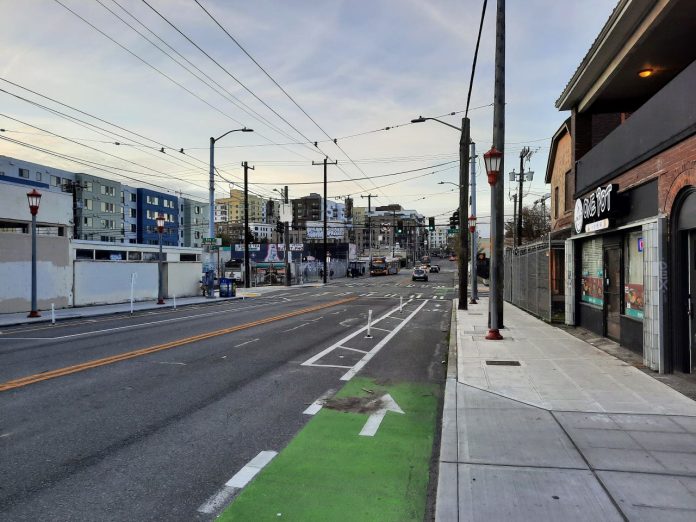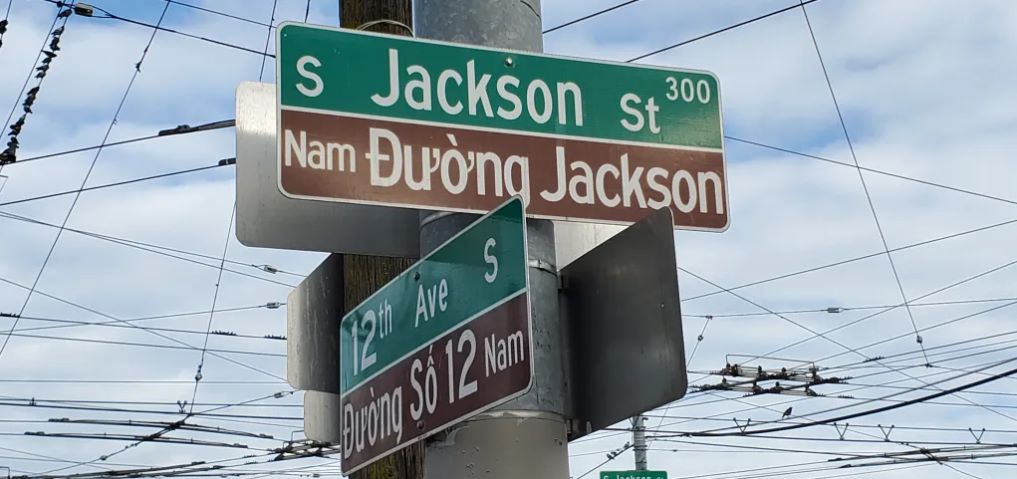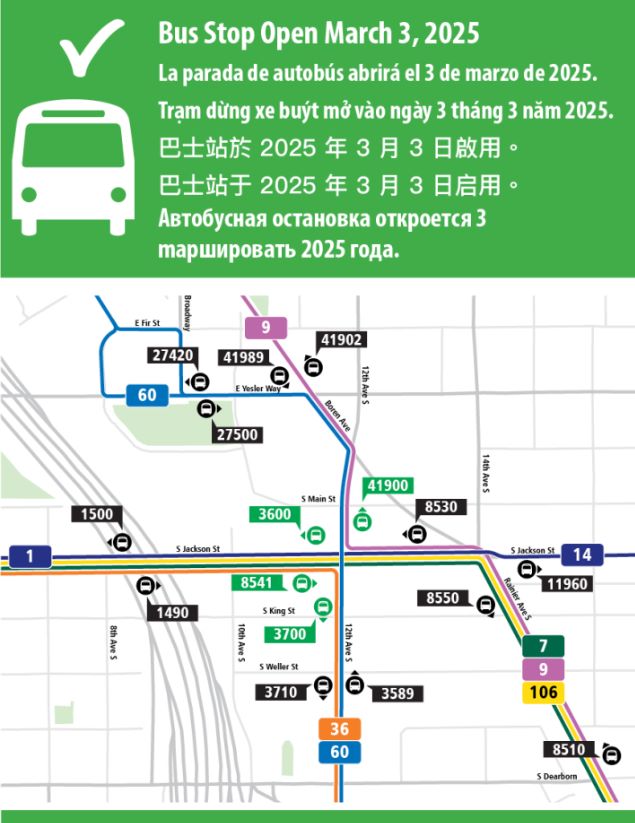
After a nearly three-month hiatus, a set of four bus stops near the intersection of 12th Avenue S and S Jackson Street in Little Saigon reopened today. King County Metro had closed the stops on December 16, 2024 in response to long-standing public safety issues. A month prior, the area made headlines as the epicenter for a string of random stabbings perpetrated by one man.
Following the bus stop closures, Metro has faced two high-profile violent incidents of transit crime elsewhere. Just two days after the bus closures, Metro bus operator Shawn Yim was stabbed to death by a passenger in the University District while on duty. Then two weeks, two riders were shot onboard a Metro bus in Tukwila.
Since December, Metro says that it has been working with King County and City of Seattle law enforcement to improve the situation around the Little Saigon bus stops.
“Our goal is for bus riders to be able to board and exit freely, and for transit operators to serve these bus stops without people unsafely blocking either the street or sidewalks,” Metro wrote on its blog last week of the bus stops.

The Seattle Police Department carried out a hotspot policing push in early 2022 that included a wave of theft arrests at 12th and Jackson, but the brief surge didn’t lead to durable change as the drug trade and stolen good fencing returned to the corner, as some critics warned would happen in the absence of a broader strategy. Though issues intensified in 2024, officials have noted some recent improvement.
“Bus stop safety conditions were monitored by a team of Metro operations, safety, facilities and police staff for several weeks,” Metro added. “Law enforcement conducted several targeted investigations and made necessary arrests for unlawful conduct to improve the conditions for transit operators, transit facilities employees, and riders waiting for bus service.”
Metro said it intends to remain vigilant, monitoring local conditions and coordinating with law enforcement and social services partners to enhance public safety and maintain reliable transit service.
“If security conditions at this location or elsewhere in Metro’s service area are concerning to customers, community members or transit operators, we encourage people to report their concerns either to law enforcement or King County Metro,” the agency wrote in its blog. “Metro will continue to use data and input from operators and customers to guide decisions and efforts to improve and address security.”
On Monday, March 3, Metro restored service to four bus stops (stop #3600, #3700, #8541, and #49100) near the 12th and Jackson intersection, benefiting riders on Routes 1, 7, 9, 14, 36, 60, and 106. This will mean shorter walks to and from the bus stop for some riders.

In the wake of Yim’s death, Metro operators and their union have pushed officials to prioritize safety countywide and get tougher on riders violating laws or Metro’s code of conduct. Responding to those calls, Metro plans to install new physical barriers on buses, replacing flimsier plexiglass doors installed as a pandemic precaution.
The new barriers will act as a cabin, securing driving spaces from rider areas with the goal of preventing assaults and harassment of operators. Metro counted 15 assaults on bus operators in 2024, including four that involved spitting. Installation of new barriers across the 1,300-vehicle bus fleet will cost about $15 million.
As pledged, the King County Council is also standing up a task force to explore ways to improve transit safety and security. That task force would include transit operators and their union officials, law enforcement, transit rider representatives, County officials, among others.
While the Little Saigon stops are reopening, Metro has closed several other bus stops in Seattle over various safety concerns in the past. On 3rd Avenue in Downtown Seattle, the northbound bus stop south of Pine Street was consolidated in 2022 due to its proximity to a drug crime hot spot. Metro also closed another stop on 3rd Avenue at James Street in the southbound direction because of frequent emergency vehicle presence blocking the curb space. Meanwhile, Metro closed a stop on S Holgate Street at Airport Way S due to traffic safety risks from the street configuration.
This article was made possible by the generous support of The Urbanist Fund. The Urbanist Fund is a 501(c)(3) organization that supports local, public-interest journalism. Visit theurbanistfund.org for more information or to make a tax-deductible gift.
Stephen is a professional urban planner in Puget Sound with a passion for sustainable, livable, and diverse cities. He is especially interested in how policies, regulations, and programs can promote positive outcomes for communities. With stints in great cities like Bellingham and Cork, Stephen currently lives in Seattle. He primarily covers land use and transportation issues and has been with The Urbanist since 2014.

